
Action over aquaculture regulation ‘shortly’ says Scottish Government
The Scottish Government has promised that an announcement on the formation of a strategic-level group that will help streamline aquaculture regulation will be made soon.
Scotland’s Rural Affairs Secretary Mairi Gougeon revealed plans to create the Ministerial Aquaculture Strategy Forum, which she will chair, at the Aquaculture UK trade fair in Aviemore nearly seven weeks ago.
Asked when the Forum would meet, and who would be taking part, the Scottish Government told Fish Farming Expert that an announcement would be made “shortly” but gave no other information.

Mistrust and dislike
The Forum is part of the process to deliver recommendations made by regulatory expert Professor Russel Griggs in an aquaculture regulatory review commissioned by the Scottish Government and published in February.
In the review, Griggs wrote: “The degree of mistrust, dislike, and vitriol at both an institutional and personal level between the industry (mainly finfish), certain regulators, parts of the Scottish Government and other stakeholders is at a level that I have never seen before which makes the current working relationships within the sector challenging.”
As such, Gougeon is likely to want high level representatives from the Scottish Environment Protection Agency (SEPA), Marine Scotland, and the salmon farming and shellfish industries, around the table, and maybe a voice from the salmon angling sector.
Working collaboratively
Speaking on Radio 4’s Farming Today programme last week, Gougeon told presenter Caz Graham: “We are committed as a government to working collaboratively with the industry, with the regulators, with the environmental organisations as well, to try and develop a sector that is environmentally and economically sustainable and that obviously operates within environmental limits, as well as with a social licence, and ensure that we do have a thriving marine ecosystem for future generations.”
In a summary of his review, Griggs said that all the people and organisations he met with or had input into the review think that the current regulatory system is not fit for purpose and in one form or another needs change.
Griggs recommended that the Scottish Government should work through a Project Board to produce, within 12 months, a 10-year framework for each part of the aquaculture sector (finfish, shellfish, and seaweed) within which all must operate. If the Scottish Government wants to keep to Griggs’ suggested timetable it will have to get the ball rolling on discussions soon.
Vision for Sustainable Aquaculture
The Forum will also advise on the development of the Scottish Government’s “Vision for Sustainable Aquaculture”, set to be published before the end of the year.
Another initiative announced by Gougeon at Aquaculture UK was the formation of a consenting task group to make rapid progress on streamlining the aquaculture consenting system.
This includes making a change to the marine licence validity period for finfish and shellfish farms from six to 25 years.
Trade body Salmon Scotland, which represents the interests of Scottish salmon farmers and the wider supply chain, has welcomed the changes proposed in Griggs’ review.























































